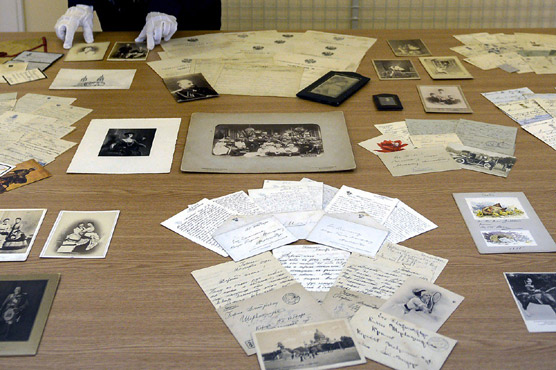A century on: Royal family's letters return to Russia

As the country marks the centenary of the end of royal rule, the collection of 200 pieces has gone on display at a museum in Tsarskoye Selo, the former summer residence of the Tsars. Photo: AFP
(AFP) - From telegrams about hunting parties to anguished letters over the Bolshevik takeover, a trove of documents detailing the private lives of Russia s Romanov family has returned home 100 years after the 1917 revolution.
The archive, containing letters, photographs and drawings, was taken to Europe by members of the royal family who fled the chaos and persecutions of the revolution.
In July, the state-owned Russian bank Sberbank bought the archive for 70,000 euros ($84,000) after its owner, who did not want to be identified, put them up for sale.

Correspondence has previously gone on display which includes this letter written by a duchess who escaped the execution of other members of the royal family in 1918. Photo: BNPS
Now, as the country marks the centenary of the end of royal rule, the collection has gone on display at a museum in Tsarskoye Selo, the former summer residence of the tsars on the outskirts of Saint Petersburg.
"These letters and telegrams reveal the everyday life of the imperial family, whose members truly loved each other," Irina Raspopova, a conservationist at the museum, told AFP.
"These archives are of huge interest to researchers. We were lucky to find them," she said.
The collection, which counts over 200 pieces dating from 1860 to 1928, features letters written by Tsar Nicholas II, Russia s last, as well as his wife Alexandra Fyodorovna, his father Alexander III and several other Romanov family members.

Most of the family of Tsar Nicholas II (left) were killed by the Communists after he stepped down from his position in 1917. Photo: Getty Images
The documents, written in Russian, French and English on paper yellowed by time, show the pampered daily lives and leisure of the Russian royalty.
In a telegram to his daughter Ksenia from the year before he died in 1895, Alexander III grumbles about a relatively unsuccessful shooting expedition.
"This is not going very well. But I have hunted and killed eleven pheasants," he wrote.
But the tone grows grimmer as the tumultuous events of 1917 unfold -- from the fall of the monarchy to the Communist seizure of power by the end of the year.
.jpg)
Alexander III s daughter, Grand Duchess Olga Alexandrovna (1882-1962). Photo: AFP
"All relations with the revolutionaries are ruined," Grand Duke Nikolai Mikhailovich, uncle of the last tsar Nicholas II, wrote the day Vladimir Lenin s revolutionary forces stormed the Winter Palace.
"It is likely that the Bolsheviks will win."
By the start of the next year the sense of doom has increased as the new authorities launched a crackdown on the members of the royal family.
"We continue to descend down a slope and it is not difficult to imagine what awaits us," the grand duke writes with growing despair.
"Alas, all of our friends are awaiting a place where there is neither joy or regret," he recorded in his final letter in February 1918.
Several months later in July the Bolsheviks executed Nicholas II and his family in the central Russian city of Yekaterinburg.
Mikhailovich was shot six months later along with his brother and cousins in Saint Petersburg.

